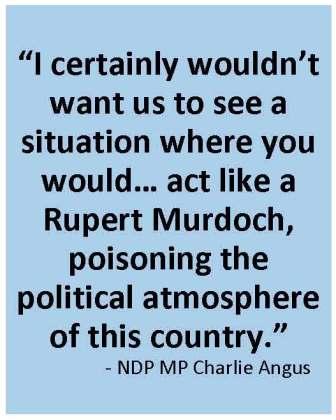
OTTAWA – Quebecor Media’s CEO used an appearance at a Parliamentary committee to slam not only the CBC/Radio-Canada for its lack of accountability to Canadians, but also other media organizations for getting into bed with the public broadcaster and refusing to take the CBC to task over its use of taxpayer money.
Speaking at the House of Commons Standing Committee on Access to Information, Privacy and Ethics, QMI president and CEO Pierre-Karl Péladeau portrayed Sun Media as being the only news organization capable of asking CBC the hard questions about how it uses public money. He spoke about access to information requests regarding a trip former CBC executive VP of French Services Sylvain Lafrance took to France, the money CBC spends to operate its fleet of vehicles and the amount of money the broadcaster spends on outdoor advertising.
He criticized the CBC for the lack of information being released. Péladeau notes that the access to information request for the vehicle fleet yielded a document of 17 pages, yet it was all redacted with the exception of one line referring to a lone 2007 Ford.
“I guess I must still have a lot to learn about creation, programming, and journalism because I fail to see what asking for information about a fleet of cars has to do with either of these activities,” Péladeau said.
“Despite what some may think… that we are waging a war against CBC/Radio-Canada, we believe that these requests are not only legal but also legitimate, in the public interest and in keeping with the Act,” he told the committee in his opening remarks. “Unfortunately the reality is that currently Sun Media is the only news organization that is sufficiently at arm’s length and independent to be able to put those questions to the public broadcaster because so many of our competitors are involved with CBC/Radio-Canada.”
He referred to journalists from Montreal newspaper La presse being on CBC-TV and radio. Péladeau spoke about the content partnership with the National Post and the national newspaper’s altered version of CBC Watch from a critical look at the public broadcaster to one promoting CBC programming. He also took a swipe at Bell Media, noting that CTV and CBC have launched a bid to obtain the television rights for the Olympics.

“Between their strategic partnerships, their advertising budget and their direct payments to journalists in other media organizations, CBC/Radio-Canada has somehow managed to quiet dissenting voices in most outlets everywhere, that is to the exception of Sun Media,” Péladeau said.
Under questioning, the QMI CEO faced a barrage of harsh questions from opposition MPs on the committee such as NDP Charlie Angus and Liberal Scott Andrews. Both of them questioned the motives of QMI in its battle to get CBC to release more information.
Angus wondered if all the small newspapers that QMI has been acquiring over the years are required to tow the party line when it comes to the CBC. He pointed to an article from Marc-François Bernier, Canada research chair in francophonie communications, specializing in journalism ethics, that criticized QMI for having a “tarnished ethical and democratic track record” and requiring journalists to write articles attacking CBC/Radio-Canada.
“I raise this because Quebecor [has] so many diversified assets yet they’re all vertically integrated under you, Mr. Péladeau. And I certainly wouldn’t want us to see a situation where you would… act like a Rupert Murdoch, poisoning the political atmosphere of this country. Would you assure us that every single journalist in all those little newspapers is not getting told how to write because it seems to be the exact same article I read?” Angus asked.
“He is absolutely wrong and I don’t know where he is getting this,” said Péladeau of the Bernier article. “No one will tell them what to write.”
Andrews pressed QMI on its request for access to information on the amount of money CBC spends on outdoor advertising and a bid for Olympic TV rights CBC is making with CTV. “You’re trying to find out commercial information about your competitor to use to your advantage,” he said.
“No we’re not looking for commercial information,” responded Péladeau. “We’re looking for information to be able to provide the proper knowledge to Canadians [so they] know how CBC/Radio-Canada manages public funds.”
The QMI CEO was also lobbed some softball questions from Conservative members of the committee. Tory MP Dean Del Mastro painted the company as being “courageous” for its efforts to go up against CBC.
“It’s kind of a courageous thing because I would argue CBC carries by far the biggest stick in the Canadian media business, especially in the news business,” he said, noting that Power and Politics has 12 producers while similar shows on the private networks have far fewer. “I mean the expenditure and the ability that CBC has is frankly outweighs any private sector broadcaster. Isn’t it fair to say that it takes a bit of courage to do that?”

“As you know, we have accountability to our shareholders and we do not have the same kind of means that CBC [has],” responded Péladeau. “They have this $1.1 billion so they’re spending it somewhere and we know that money is no object with them and it’s the way they operate.”
Péladeau also took some time to respond to a CBC release attacking QMI over the $500 million in public funding it has received over the last three years, the majority being $323 million in the form of a discount in the last spectrum auction because there was a set aside for new entrants.
“I found that completely defamatory and dangerous because I’ve been looking at the numbers they’ve been mentioning and I’ve never seen something so false and so malicious. In fact right now we are reviewing our legal recourses to find out what will be the follow up with that,” he said in response to a question from Del Mastro.


